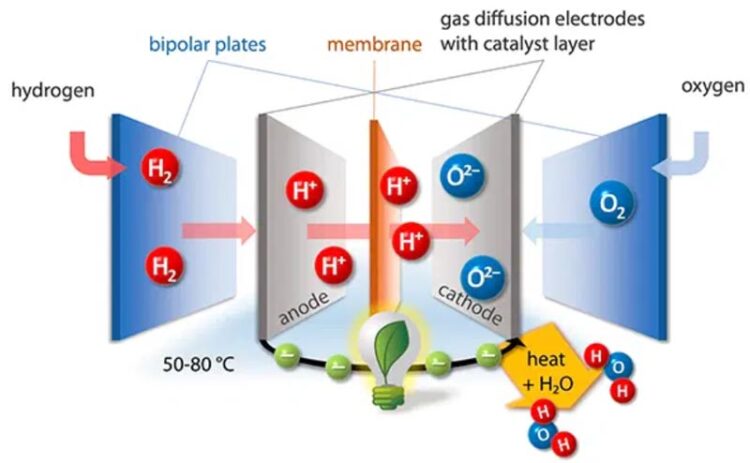Internationalisation of sustainable hydrogen technology

Functional diagram of a PEM fuel cell.
(c) Andreas Rosin, University of Bayreuth
Green hydrogen and fuel technology are a new focus of the Export Initiative Environmental Technologies (EXI). The University of Bayreuth has recently become involved in this funding programme of the Federal Ministry for the Environment, Nature Conservation, Nuclear Safety and Consumer Protection (BMUV) with its “ECO-FCGen – decentralized power generator based on fuel cells” project. The aim of the project is to build two electricity generation prototypes based on green hydrogen in Germany and India. Research partners are CBC GmbH & Co. KG in Ibbenbüren and the Fraunhofer Institute for Manufacturing Engineering and Automation (IPA) in Stuttgart.
Media Contact
All latest news from the category: Power and Electrical Engineering
This topic covers issues related to energy generation, conversion, transportation and consumption and how the industry is addressing the challenge of energy efficiency in general.
innovations-report provides in-depth and informative reports and articles on subjects ranging from wind energy, fuel cell technology, solar energy, geothermal energy, petroleum, gas, nuclear engineering, alternative energy and energy efficiency to fusion, hydrogen and superconductor technologies.
Newest articles

Largest magnetic anisotropy of a molecule measured at BESSY II
At the Berlin synchrotron radiation source BESSY II, the largest magnetic anisotropy of a single molecule ever measured experimentally has been determined. The larger this anisotropy is, the better a…

Breaking boundaries: Researchers isolate quantum coherence in classical light systems
LSU quantum researchers uncover hidden quantum behaviors within classical light, which could make quantum technologies robust. Understanding the boundary between classical and quantum physics has long been a central question…

MRI-first strategy for prostate cancer detection proves to be safe
Active monitoring is a sufficiently safe option when prostate MRI findings are negative. There are several strategies for the early detection of prostate cancer. The first step is often a…



